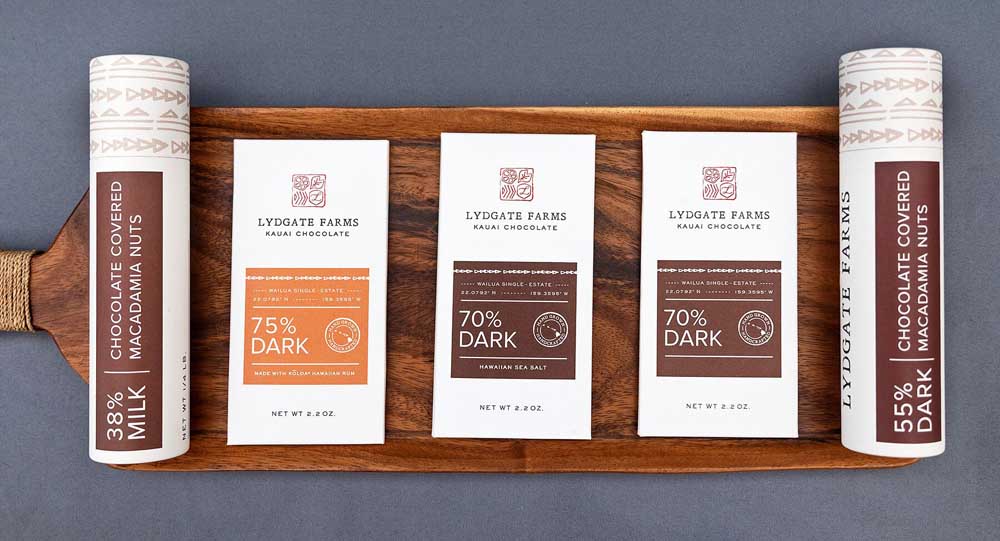Meet the Hawaiian cacao farmer working to change the chocolate industry
Published 4:30 pm Monday, February 14, 2022

- Lydgate chocolate
In the lush upcountry of Kauai, above the foothills of Kapaa, Lydgate Farms is proudly carrying on the legacy of Hawaiian small-scale sustainable farming. Rich in botanicals, fruits, honey and cacao, the property is a bountiful oasis — and the source of some of the best chocolate in the world.
Owned by siblings Will and Emily Lydgate, fifth-generation Hawaiian farmers, the namesake farm offers unique opportunities to experience cacao, chocolate’s primary ingredient, firsthand. Visitors can learn about the cacao-growing process and sample raw cacao, scooped from freshly cracked pods, as part of the reservation-only “branch-to-bar” farm tour and multi-course chocolate-tasting. For those who are happy to get their hands dirty, Lydgate offers volunteers an opportunity help harvest cacao pods.
Trending
Hawaii is the only state in the U.S. that supports a commercial cacao agriculture industry, and farms like Lydgate are paving the way for a new generation of environmentally focused and socioeconomically conscientious chocolate makers. Eschewing the questionable labor and farming operations on which the cacao industry was built, Lydgate Farms champions equitable and ethical cacao production.
Land and family: an intertwined history
Will and Emily’s great-great-grandfather, William Ludgate (the spelling was later changed to “Lydgate”), arrived in the Kingdom of Hawaii in 1865 and settled on the Big Island. An innovative farmer, Ludgate used cover crops to enrich the soil and flumes (narrow channels of water) to transport the cane on his farm. His son, J.M. Lydgate, who was a child when the family emigrated, learned to speak fluent Hawaiian and became a trained botanist and an ardent protector of the islands. In the 1890s, J.M. settled on Kauai. One of the most popular spots in Kauai, Lydgate Beach Park, memorializes his conservation work.
Will Lydgate recalls his introduction to cacao in the late 1990s when he and his father decided to try planting cacao trees. “Neither of us knew how to grow and process the chocolate,” he chuckles. But the family bought some rough land in 1998 and developed it into Steelgrass Farm. Soon after, they planted their first cacao trees and celebrated an inaugural harvest in 2008. Lydgate changed the farm’s name to match his family’s in 2017.
From learning-by-doing to twice receiving best-in-world recognition at the Cocoa of Excellence Awards in Paris, France, the farm exemplifies successful American cacao production. While Lydgate admits to feeling like a bit of an underdog among the award winners, he hardly sees that as a disadvantage.
How your favorite chocolate gets from branch to bar
Trending
“We’re like the Jamaican bobsled team of chocolate,” he remarks. “Everyone else takes it so seriously, and we’re very fun. We like to host volunteer harvest parties. People come and scoop out the cacao pods and stay for chocolate and cacao nectar popsicles after. Sometimes we light up the barbecue, too, and bust out the guitars and upright bass and sing songs.”
Today Lydgate Farms spans about 47 acres and is a draw for pollinators, especially honey bees. The property’s extensive assortment of flora includes vanilla vines, more than 2,600 cacao trees and over 100 different kinds of fruit and flowering trees, palm and bamboo. The farm’s plants are part of an historic and complex Hawaiian ecosystem, one the Lydgate family is committed to protecting.
Practicing Malama ‘Aina through regenerative agriculture
Lydgate’s mission is to change the way people think about chocolate. “We want to be that chocolate grower. The one that’s your absolute favorite — who also shows you that chocolate does grow on trees. And that chocolate doesn’t have to come with some of the downsides of the post-colonial, industrial agricultural supply chain,” he says.
Harkening back to his ancestors’ commitment to the local environment, preservation of the island’s land and resources remains a driving force on the farm. The Hawaiian phrase Malama ‘Aina captures this ideology. Translating roughly to “caring for the land, so it can sustain future generations,” Lydgate is doing just that by embracing regenerative agriculture.
Sugarcane and pineapple were Hawaii’s primary commodity crops throughout most of the 20th century. However, rising labor costs and the growth of mechanization elsewhere in the world ended their reign, but not before taking a toll on the soil.
“Now we use organic fertilizers and regenerative practices to grow sustainable cacao trees. We mulch, compost and utilize cover crops,” Lydgate explains. Employing an agroforestry system that incorporates interplanting (which makes the most of the land by planting fast-growing crops between slower-growing ones) and helps Lydgate naturally put more organic matter into the farm’s soil.
The evolving chocolate industry: Leading change from within
By emphasizing sustainable cacao production, socioeconomic cognizance and product education, Lydgate Farms is carving out a place in an evolving global chocolate industry. “We may be one of the smallest producers of chocolate in the world, but because we’re here in the United States, we also have the ear of the American public — and a whole visitor industry that we can help teach,” Lydgate points out.
As co-owner of the biggest cacao farm on Kauai, Lydgate aims to spread his mission of building a renewed, eco-friendly and viable agricultural industry for Hawaii. “By teaching American and global consumers how chocolate is made, we can help cacao farmers in poorer parts of the world,” he notes. “We’re all people and we need to try and care for one another. I really believe that if we help build that ripple effect and put our good word where it does the most, it will spread across the globe.”



